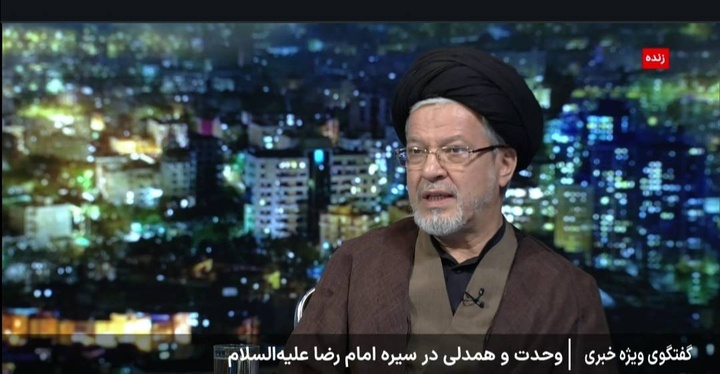In a televised interview marking the martyrdom anniversary of Imam Reza, Hoj. Seyyed Saeedreza Ameli, scientific secretary of the Imam Reza Congress and member of Iran’s Supreme Council of the Cultural Revolution, described the 8th Shia Imam as a universal figure whose teachings transcend national boundaries.
“Imam Reza’s burial site in Iran has created a unique spiritual bond with the country, yet his legacy belongs to the world”, Ameli emphasized.
He noted: “The Imam’s rational governance, interfaith dialogue, and moral conduct offer a global model for unity and justice. The titles “Imam al-Raouf” (the Gracious Imam) and “Alem Al Muhammad” (the Scholar of Prophet’s Progeny) reflect his compassionate and scholarly stature, as affirmed in the sayings of Prophet Muhammad and Imam Musa al-Kazim”.
He cited the Hadith of the Golden Chain as a clear expression of monotheism and spiritual leadership, rooted in the event of Ghadir. “Justice”, Ameli said, “was a defining trait of Imam Reza, who rejected social discrimination and shared meals with servants and lepers. Such actions, recorded in classical texts, deepened his global appeal”.
Ameli also highlighted Imam’s intellectual depth, referencing debates preserved in works like Ihtijaj al-Tabarsi, where he responded to insults with reason and patience. He linked this approach to Quranic ethics, noting, “Imam Reza countered verbal and non-verbal humiliation with wisdom and restraint”.
“The Imam’s respectful engagement with Christians, Jews, Zoroastrians, and Sabians during the Abbasid era was presented as a model for modern Iran. His acceptance of the crown prince role under Ma’mun, with conditions of non-interference in politics, allowed him to spread spiritual teachings across a vast empire”, the scholar pointed out.
Ameli stated that between five to seven million foreign pilgrims visit Imam Reza Shrine annually, including Arabs, South Asians, and Azeri-speakers. “Even Sunni Muslims and non-Muslims are among the regular visitors, with 10,000 non-Muslim pilgrims recorded each year”.
He concluded by condemning global injustice and militarism, citing Gaza as a tragic example. He argued: “Imam Reza’s worldview sees humanity as a single body and calls for a return to ethical and intellectual realms regarding human issues”.

A member of Iran’s cultural council highlights Imam Reza’s global legacy of unity, dialogue, and ethical leadership.
News Code 7098

Your Comment